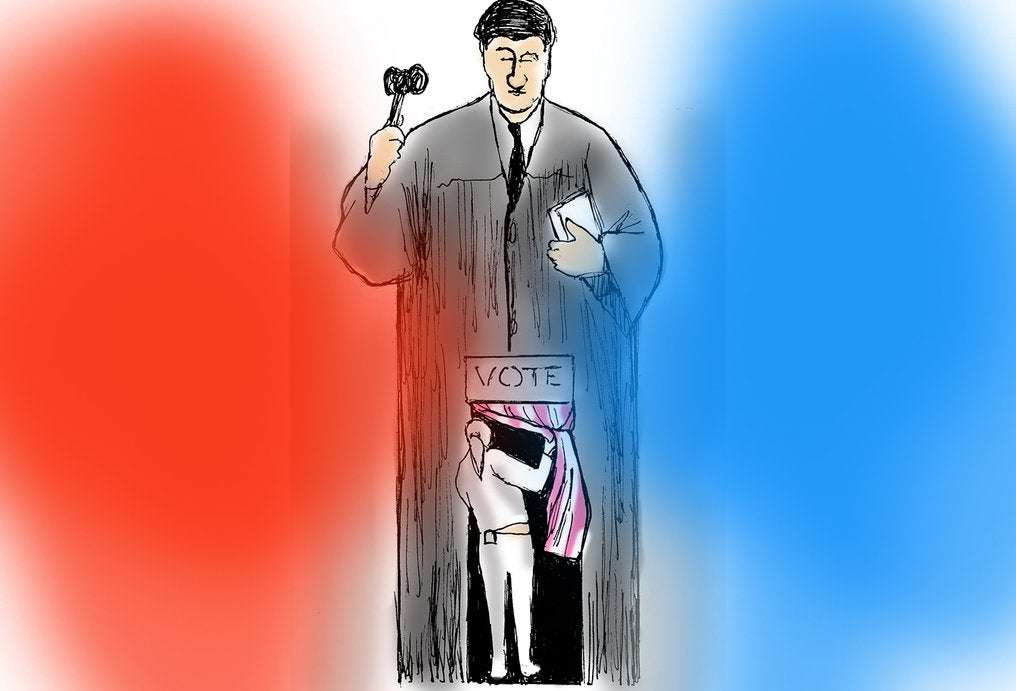The BDN Opinion section operates independently and does not set newsroom policies or contribute to reporting or editing articles elsewhere in the newspaper or on bangordailynews.com.
Noah Feldman is a Bloomberg Opinion columnist and a professor of law at Harvard University.
The Supreme Court is unraveling. The leak last week of Justice Samuel Alito’s draft opinion that would overturn the 1973 abortion-rights precedent Roe v. Wade is just part of it.
The court began to leak even before the opinion (there were reports in late April that Chief Justice John Roberts was trying to coax Justice Brett Kavanaugh to abandon the anti-Roe majority) as well as after (there were reports that Kavanaugh hadn’t wavered). Huge fences have gone up around the court, blocking access for protesters and everybody else. The justices are also facing protests outside their homes.
The importance of these developments lies in how they are transforming the institution’s political character. The justices’ decisions have never been apolitical. How could they be, when hard questions of constitutional law require the application of moral judgment about political institutions? Yet the justices haven’t been seen as politicians — nor have they seen themselves that way.
That’s changing. The court’s deliberations hadn’t leaked the way the political branches do. Now they do — because ordinary institutional politics provides benefits to leaking.
Congress and the White House need to be guarded aggressively from the public because politics incenses some people and makes others downright crazy. Now, quite suddenly, the Supreme Court needs similar protection.
Justices historically have not usually been surrounded by security details. Justice David Souter used to jog by himself around the Southeast Washington neighborhood where he lived. Justice Stephen Breyer walks through Cambridge, Massachusetts, unmolested and often unrecognized.
Now the justices are likely to need personal protection. Protesters won’t just gather in front of the conservatives’ homes. The liberals will be in for it, too.
The reason this is all happening is that the Supreme Court is doing something unprecedented in almost a century, namely planning to take away a right that it guaranteed almost 50 years ago. The court has long operated by expanding individual liberties, not contracting them.
This kind of change in the way the court operates and is perceived as a political body is disrupting the infrastructure that has sustained the court’s institutional life.
Make no mistake: The threat of overturning Roe is what generated the leaks. It’s what is generating the protests. The flip in the court’s abortion jurisprudence is making the justices look like politicians and the court like a political institution.
Conservatives would no doubt rejoin that it was Roe v. Wade that made the court political, not the effort to overturn it. Although there is some plausibility to this argument insofar as Roe took abortion rights out of the hands of state legislatures, the truth is that the Roe decision was not inherently more political than the great court decisions of the 1950s and 60s, including Brown v. Board of Education. Expanding individual liberties inevitably puts the court in a position of ruling legislative preferences unconstitutional. Doing so is political in the sense that it relies in part on political-moral judgments. But it wasn’t and need not be political in the institutional sense.
Since World War II, the Supreme Court as an institutional actor found a way to protect and expand individual freedom while building a sense of its own legitimacy and role. Liberals liked the big rights expansions for women and gays, for example. Conservatives liked the expansion of free speech rights, to corporations and individuals alike. Both sides wanted the court to tilt their way. Both sides thought that the court’s legitimacy was desirable to the extent it served them.
Even the Bush v. Gore decision, which settled the deadlocked 2000 election in favor of George W. Bush, didn’t derail the court’s legitimacy. It was followed over the next decade and a half by the court’s slow but firm series of decisions against unlawful detention in the war on terror and in favor of same-sex marriage. Conservatives got a ruling that partly defanged the Affordable Care Act and the Citizens United decision invalidating restrictions on campaign donations that Democrats had favored. The legitimacy balance held.
That balance is now likely to be displaced. That means Americans will not be able to rely on the court to protect and expand liberty in a way that achieves national buy-in. That, in turn, will leave people wondering who, exactly, will have the institutional role of protecting individual rights. State legislatures? Congress? The president?
The answer is none of the above. Politicians, at least in the U.S., aren’t very good at protecting liberty. If, as appears likely, the Supreme Court takes itself out of the liberty protection business, its justices will look like politicians.

Venture_Communist20 on May 16th, 2022 at 00:10 UTC »
If Roberts wants to truly save the integrity of the court he should resign while Biden can still place a new justice on the court. He should do this because of what McConnell did to Obama's pick. If the Senate flips this November McConnell will pull the same stunt.
thepartypantser on May 15th, 2022 at 23:57 UTC »
When the GOP set one standard for the hearing for Obama's nominee, then abandoned that standard in a move of astounding hypocrisy 4 years later, the court lost legitimacy in the eyes of many Americans.
The GOP cheated to politicize the court to their advantage. You can lay the blame for this situation directly at their feet.
Karma-Kosmonaut on May 15th, 2022 at 23:49 UTC »
The Supreme Court has no legitimacy.